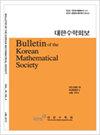ADMISSIBLE INERTIAL MANIFOLDS FOR INFINITE DELAY EVOLUTION EQUATIONS
IF 0.5
4区 数学
Q3 MATHEMATICS
引用次数: 1
Abstract
The aim of this paper is to prove the existence of an admissible inertial manifold for mild solutions to infinite delay evolution equation of the form du dt +Au = F (t, ut), t ≥ s, us(θ) = φ(θ), ∀θ ∈ (−∞, 0], s ∈ R, where A is positive definite and self-adjoint with a discrete spectrum, the Lipschitz coefficient of the nonlinear part F may depend on time and belongs to some admissible function space defined on the whole line. The proof is based on the Lyapunov-Perron equation in combination with admissibility and duality estimates.无限延迟演化方程的可容许惯性流形
本文的目的是为了证明一个容许惯性流形的存在轻微解决无限延迟演化方程的形式du / dt +非盟= F (t, ut), t≥年代,我们(θ)=φ(θ),∀θ∈(−∞,0),s∈R,在正定,自伴的离散谱,李普希茨系数的非线性F可能取决于时间和属于一部分容许函数空间上定义整个线。该证明基于李雅普诺夫-佩龙方程,并结合可容许性和对偶性估计。
本文章由计算机程序翻译,如有差异,请以英文原文为准。
求助全文
约1分钟内获得全文
求助全文
来源期刊
CiteScore
0.80
自引率
20.00%
发文量
0
审稿时长
6 months
期刊介绍:
This journal endeavors to publish significant research of broad interests in pure and applied mathematics. One volume is published each year, and each volume consists of six issues (January, March, May, July, September, November).

 求助内容:
求助内容: 应助结果提醒方式:
应助结果提醒方式:


